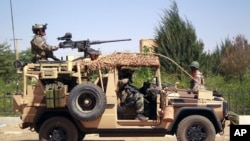With French-backed government forces advancing in northern Mali after seizing the Islamist rebel strongholds of Timbuktu and Gao, leaders in neighboring Libya are raising the alarm, warning of a spillover that could see rebel Tuareg and al-Qaida-linked fighters fleeing into Libyan territory.
A mass exodus of Malian rebels would pose a severe challenge for Libya’s new rulers. They are already struggling to contain security problems of their own, including Islamist-related violence in the country’s second city of Benghazi, which has gone through a series of bombings and assassinations in recent weeks.
Last week’s attack on a natural gas plant in Algeria – mounted by al-Qaida militants opposed to the French intervention in Mali – has heightened fears in North African and Western capitals of more attacks by jihadists on energy facilities in Mali’s neighbors.
“We know that if the situation in Mali deteriorates, it will have serious consequences for Libya,” says Foreign Minister Mohammed Abdulaziz.
One factor in the Mali insurgency was the influx of hardened fighters from Libya after the downfall of Colonel Moammar Gadhafi. These fighters brought with them weapons plundered from unsecured Libyan arsenals in the weeks and months following Gadhafi’s downfall, say regional security experts.
Libyan weapons
Last November, Mokhtar Belmokhtar, the jihadist mastermind behind the attack on the Ain Amenas gas plant in Algeria, bragged to a Mauritanian news website that al-Qaida in the Islamic Maghreb (AQIM) looted Libyan weapons during the eight-month-long uprising.
During an African Union summit in Ethiopia last week, Libyan Foreign Minister Abdulaziz talked with his counterparts from neighboring countries about how to cope with any spillover from Mali. One idea they discussed was urging the United Nations to deploy a peacekeeping force in northern Mali once the French intervention had concluded.
“Our vision is that when the operation ends, the Security Council should consider deploying a limited peacekeeping force in the area,” said Abdulaziz.
During the Libyan civil war, Tuaregs – mostly from Mali – served in Gaddafi’s military and security agencies and were among the most dependable troops fighting against the NATO-supported rebellion. After Gadhafi's fall, thousands of them fled to make common cause with Tuareg separatists in Mali, subsequently forming an alliance with al-Qaida in the Islamic Maghreb.
Tuareg fighters
The return of an estimated 2,000 to 4,000 experienced and well-armed Tuaregs strengthened the ranks of separatist insurgents and Islamist groups that attacked Mali’s army in early 2012, effectively seizing control of the north of the country in April.
In December, Libyan Prime Minister Ali Zeidan announced the closing of Libya’s southern border. Security experts greeted the announcement with skepticism, arguing that Libya didn't have enough military resources to police the length of the country’s southern borders of nearly 4,600 kilometers.
Earlier this month, and just four days before al-Qaida-linked fighters from Mali attacked the Ain Amenas gas facility in Algeria, Libyan, Algerian and Tunisian leaders pledged to cooperate to improve border security.
But all three countries are confronted by the same problem: long remote desert borders that are hard to monitor let alone police.
Porous borders
Even before the Arab Spring, jihadist fighters and traffickers in tobacco, drugs and guns could cross the desert borders with relative ease. But those borders have become even less secure over the past two years, according to security expert Paul Sullivan, an analyst at the National Defense University in Washington, DC.
“AQIM and others like them find moving about the deserts and in cities a lot easier than when the dictators slammed on just about everyone,” said Sullivan.
The al-Qaida-linked fighters who mounted last week’s assault on the Ain Amenas compound are thought to have entered Algeria undetected by taking a circuitous route through Libya from their camps in Africa’s arid Sahel, mostly likely transiting the Salvador Pass on Libya’s border with Algeria and Niger, say U.S. and Libyan security sources.
Speaking on Libya’s Alwataneya TV station last week, Libya’s Prime Minister Ali Zeidan said he was deeply worried about possible fallout from Mali. He called on North African countries and those in the Sahel region to the south to develop security plans to contain the violence.
Libya is now focusing its forces on strengthening security around its oil facilities on the borders with Tunisia, Algeria and Niger, government officials say.
A mass exodus of Malian rebels would pose a severe challenge for Libya’s new rulers. They are already struggling to contain security problems of their own, including Islamist-related violence in the country’s second city of Benghazi, which has gone through a series of bombings and assassinations in recent weeks.
Last week’s attack on a natural gas plant in Algeria – mounted by al-Qaida militants opposed to the French intervention in Mali – has heightened fears in North African and Western capitals of more attacks by jihadists on energy facilities in Mali’s neighbors.
“We know that if the situation in Mali deteriorates, it will have serious consequences for Libya,” says Foreign Minister Mohammed Abdulaziz.
One factor in the Mali insurgency was the influx of hardened fighters from Libya after the downfall of Colonel Moammar Gadhafi. These fighters brought with them weapons plundered from unsecured Libyan arsenals in the weeks and months following Gadhafi’s downfall, say regional security experts.
Libyan weapons
Last November, Mokhtar Belmokhtar, the jihadist mastermind behind the attack on the Ain Amenas gas plant in Algeria, bragged to a Mauritanian news website that al-Qaida in the Islamic Maghreb (AQIM) looted Libyan weapons during the eight-month-long uprising.
During an African Union summit in Ethiopia last week, Libyan Foreign Minister Abdulaziz talked with his counterparts from neighboring countries about how to cope with any spillover from Mali. One idea they discussed was urging the United Nations to deploy a peacekeeping force in northern Mali once the French intervention had concluded.
“Our vision is that when the operation ends, the Security Council should consider deploying a limited peacekeeping force in the area,” said Abdulaziz.
During the Libyan civil war, Tuaregs – mostly from Mali – served in Gaddafi’s military and security agencies and were among the most dependable troops fighting against the NATO-supported rebellion. After Gadhafi's fall, thousands of them fled to make common cause with Tuareg separatists in Mali, subsequently forming an alliance with al-Qaida in the Islamic Maghreb.
Tuareg fighters
The return of an estimated 2,000 to 4,000 experienced and well-armed Tuaregs strengthened the ranks of separatist insurgents and Islamist groups that attacked Mali’s army in early 2012, effectively seizing control of the north of the country in April.
In December, Libyan Prime Minister Ali Zeidan announced the closing of Libya’s southern border. Security experts greeted the announcement with skepticism, arguing that Libya didn't have enough military resources to police the length of the country’s southern borders of nearly 4,600 kilometers.
Earlier this month, and just four days before al-Qaida-linked fighters from Mali attacked the Ain Amenas gas facility in Algeria, Libyan, Algerian and Tunisian leaders pledged to cooperate to improve border security.
But all three countries are confronted by the same problem: long remote desert borders that are hard to monitor let alone police.
Porous borders
Even before the Arab Spring, jihadist fighters and traffickers in tobacco, drugs and guns could cross the desert borders with relative ease. But those borders have become even less secure over the past two years, according to security expert Paul Sullivan, an analyst at the National Defense University in Washington, DC.
“AQIM and others like them find moving about the deserts and in cities a lot easier than when the dictators slammed on just about everyone,” said Sullivan.
The al-Qaida-linked fighters who mounted last week’s assault on the Ain Amenas compound are thought to have entered Algeria undetected by taking a circuitous route through Libya from their camps in Africa’s arid Sahel, mostly likely transiting the Salvador Pass on Libya’s border with Algeria and Niger, say U.S. and Libyan security sources.
Speaking on Libya’s Alwataneya TV station last week, Libya’s Prime Minister Ali Zeidan said he was deeply worried about possible fallout from Mali. He called on North African countries and those in the Sahel region to the south to develop security plans to contain the violence.
Libya is now focusing its forces on strengthening security around its oil facilities on the borders with Tunisia, Algeria and Niger, government officials say.












